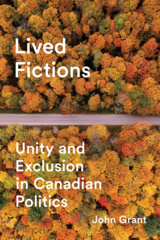
Comparing Canada
Methods and Perspectives on Canadian Politics
Debating how Canada compares, both regionally and in relation to other countries, is a national pastime. This book examines how political scientists apply diverse comparative strategies to advance the understanding of Canadian political life.
By applying comparative approaches to a wide range of research questions, three questions are explored: First, how do Canadians compare their country? That is, what are the diverse approaches, methods, and theories used to understand Canada from a comparative perspective? Second, why do Canadians compare – what are the objectives of comparative research that includes Canada? And third, what can we learn about Canadian politics through comparison?
Using a variety of methods, the contributors examine topics as diverse as Indigenous rights, Canadian voting behaviour, and climate policy. While the theoretical perspectives and kinds of questions asked vary greatly, as a whole they demonstrate how the “art of comparing” is an important strategy for understanding Canadian identity politics, political mobilization, political institutions, and public policy.
As a resource for comparative outlooks on Canada, this collection will be an invaluable guide for scholars and students of political science.
This is a noteworthy edited collection which illustrates the benefits of comparative studies in political science in Canada. It will appeal more to specialist readers than general readers as some of the chapters are quite theoretical, but it is nevertheless highly recommended.
Through the range of its topics, theories, and methodologies, Comparing Canada will appeal to a wide scholarly readership, and will also be a useful teaching tool. Authored by leading authorities in the various subfields of Canadian political science, it is engagingly written, presenting complex matters in an accessible style that situates readers in the key debates.
Comparing Canada contains much fresh research and analysis by top-drawer scholars. It will be attractive to those in many different disciplines who use the comparative method, as well as to practitioners and civil servants.
Luc Turgeon and Jennifer Wallner are assistant professors in the School of Political Studies at the University of Ottawa. Martin Papillon is an associate professor in the Department of Political Science at the Université de Montréal. Stephen White is a Social Science and Humanities Research Council of Canada Postdoctoral Research Fellow in the Department of Political Science at Concordia University.
Contributors: Daniel Béland, Éric Bélanger, Antoine Bilodeau, Gerard W. Boychuk, Jean-François Godbout, Kristin R. Good, Peter Graefe, David Houle, Erick Lachapelle, André Lecours, Rianne Mahon, Michael Orsini, Barry G. Rabe, Laura B. Stephenson, Debra Thompson, Sarah Marie Wiebe
1 Introduction / Luc Turgeon
Part 1: The Politics of Diversity
2 Framing Self-Determination: The Politics of Indigenous Rights in Canada and the United States / Martin Papillon
3 The Management of Nationalism in Canada and Spain / André Lecours
4 The Comparative Study of Race: Census Politics in Canada, the United States, and Great Britain / Debra Thompson
Part 2: Political Mobilization
5 The Comparative Study of Canadian Voting Behaviour / Éric Bélanger and Laura B. Stephenson
6 Canadian Immigrant Electoral Support in Comparative Perspective / Stephen White and Antoine Bilodeau
7 Between Hope and Fear: Comparing the Emotional Landscapes of the Autism Movement in Canada and the United States / Michael Orsini and Sarah Marie Wiebe
Part 3: Political Institutions and Public Policy
8 Parliamentary Politics and Legislative Behaviour / Jean-François Godbout
9 Comparing Federations: Testing the Model of Market-Preserving Federalism on Canada, Australia, and the United States / Jennifer Wallner and Gerard W. Boychuk
10 Climate Compared: Sub-Federal Dominance on a Global Issue / David Houle, Erick Lachapelle, and Barry G. Rabe
11 Putting Canadian Social Policy in a Comparative Perspective / Rianne Mahon and Daniel Béland
12 Economic Development Policies in Ontario and Quebec: Thinking about Structures of Representation / Peter Graefe
13 Governing Immigrant Attraction and Retention in Halifax and Moncton: Do Linguistic Divisions Impede Cooperation? / Kristin R. Good
14 Conclusion / Martin Papillon, Luc Turgeon, Jennifer Wallner, and Stephen White
Index









